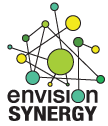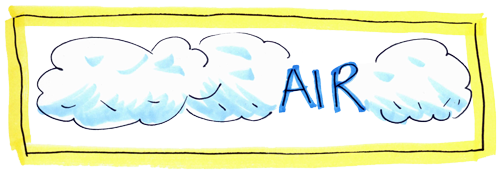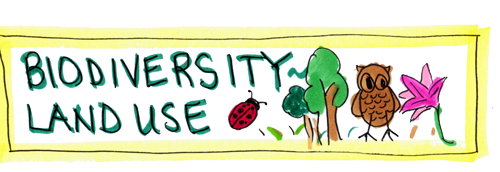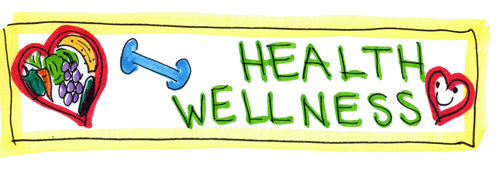In working towards strong, effective organizations and multi-organizational solutions for a healthy planet and happy people, we have completed projects in:
Air; Arts, culture and tourism; Environmental sustainability; Food and agriculture; Forestry; Health and wellness; Land use and biodiversity; Social services and equity; Transit and transportation; Water and more.
Take a look at sample projects below. Or, check out a full list of projects here.
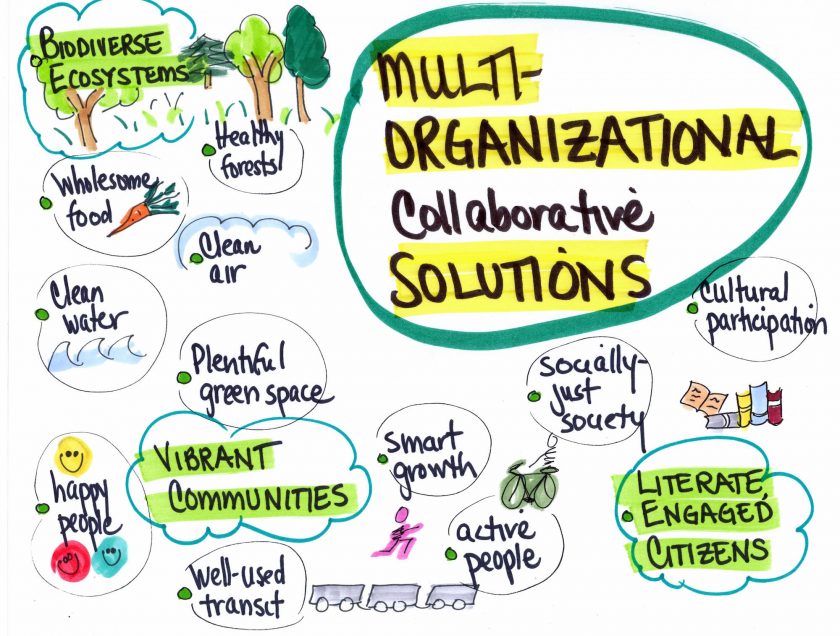
Collaboration for Climate Justice: Reducing Greenhouse Gases
Reducing greenhouse gas concentration in Toronto is no easy feat. It will require expanded thinking on how we approach the work and who is involved in implementation. envision supported and coached the Toronto Environmental Alliance, Social Planning Toronto and the Centre for Young Black Entrepreneurs in creating a theory of change and evaluation markers that laid out how to include under-served communities in Toronto in playing a central role retrofitting buildings as a way to reduce greenhouse gases. This project also involved capacity building on partnership development to ensure a good fit among environmental and social justice organizations.
Setting Priorities for Action with Mobile Source Air Pollution
Although climate change is perhaps today’s most pressing issue, knowing where to start and what priorities to work on can be overwhelming. Canadian Council of Ministers of the Environment hired envision to lead a workshop with its “Mobile Sources Working Group.” Participants looked at how to set priorities regarding pollution emanating from mobile sources, particularly, from the trucking industry.
Evaluation of Air Quality Monitoring Networks
Monitoring concentrations of potential air pollutants is necessary to know the state of Canada’s air quality. Working for the Canadian Council of Ministers of the Environment (CCME) envision led a team that worked with jurisdictions across Canada to investigate the adequacy of Canada’s network of air quality monitoring stations. envision designed a logic model and an electronic survey, and collaborated with team members to analyze and interpret the data from the survey. The results showed both strengths and areas to be improved for locations of stations and substances being monitored.
Museums as Catalysts for a Sustainable Culture
“Business as usual” is not necessarily the path towards a flourishing and sustainable planet and society – a cultural shift of potentially great proportions is needed. As cultural institutions themselves, museums are uniquely positioned to foster this shift. First, however, museums themselves would benefit from operating as flourishing organizations. Working for Ontario College of Art and Design University, Strategic Foresight Lab, envision, together with Worldviews Consulting, looked at the degree to which Toronto area museums mapped onto a 16 element framework that enables those organizations to create profit, produce social value and simultaneously regenerate the natural environment.
Improving Collaboration in Cultural Heritage
Nearly all of our current challenges involve working well together in some form or fashion. Heritage Canada/Prairie Region hired envision to lead a practical and fun session on “Principles of Collaboration,” enabling staff to add new tools for working together to their toolbox.
Identifying Audiences Served and Research Priorities for the Ontario Biodiversity Science Forum
As part of the Ontario Biodiversity Strategy, the Ontario Government established the Ontario Biodiversity Science Forum to coordinate biodiversity research in the province. After meeting for 18 months, the Forum was at an impasse, struggling with its priorities and who it served. envision was hired to design and lead a participatory workshop with governmental and academic scientists, and non-governmental organization members so that it could focus collectively on priority scientific issues. The conversation moved successfully from verbal discussion to participatory diagramming which enabled the Forum to clarify who it served, and the direction it should be heading. envision then designed and facilitated a 100+ person workshop in which participants collectively identified research priorities on biodiversity to support strategy implementation.
Strategic Planning for Ontario Land Trust Alliance
An effective strategic plan guides an organization’s continued development and longevity. It should answer some basic questions such as “what is our purpose,” “who do we serve,” and “how well are we meeting the needs of our target audience?” Ontario Land Trust Alliance hired envision to lead them through a participatory strategic planning process. Using an “at the wall” brainstorming technique, envision helped participants quickly identify their ideas and cluster them without wasting time on premature evaluation. To facilitate action planning, envision graphically recorded all action steps visually in a compelling summary that the Trust was able to refer to in future.
Creating an Adaptive Management Plan for Maumee Bay, MI
When one thinks of ecosystem integrity, diversity is a key consideration. Working for The Nature Conservancy of Michigan, envision designed and led three sessions with government agencies of all levels and non-governmental organizations to craft plans to maximize biological suitability for both aquatic animals (fish) and terrestrial (birds), resulting in an Adaptive Management Plan for North Maumee Bay, Michigan.
Environmental Collaboration in Western New York
Despite western New York’s reputation from Love Canal’s environmental challenges, the region also boasts internationally known resources such as Niagara Falls and many of Frank Lloyd Wright’s architecturally significant buildings. The Community Foundation for Greater Buffalo hired envision through the Institute of Conservation Leadership to work with nearly 200 groups involved in preparing a set of priorities for the region. The sessions that envision designed and led on effective teamwork, and collaboration resulted in an improved ability to work together to solve regional environmental and natural resources issues.
envision also designed and co-led (with Institute for Conservation Leadership) an organizational assessment workshop that enabled leaders of area non-governmental organizations to determine their strengths and learn from their peers in areas where they wanted to improve how their organizations functioned.
Residential “Learning Networks” on Organizational Effectiveness with “Good to Great”
Many small environmental non-profits in Ontario work in relative isolation from their peers in doing important environmental protection work. Working for the Sustainability Network, envision designed and led three cohorts of three multi-day-day residential peer learning seminars. Using Jim Collins’ Good to Great framework for organizational effectiveness as a unifying concept, the sessions consisted of segments on principles of effective organizations combined with structured peer learning components and time to reflect on longer term organizational priorities.
Evaluating the “Environmental Prosperity” Initiative
Although we know that working together ultimately creates more impact, actually doing that work can be challenging. Environmental Defence Canada hired envision to assess the effectiveness of a collaboration of presenting a unified voice for the Green Prosperity Initiative. envision created and implemented an electronic survey, and conducted focus groups. Information from the survey and focus groups provided the data for recommendations to improve future efforts for collaboration among environmental non-governmental organizations in Ontario.
Academic Training in Urban Sustainability
envision wholeheartedly supports building the capacity of the next generation of leaders who will move our society towards a healthy planet and happy people. For the Department of Geography at Ryerson University, envision designed and taught the inaugural course of “Sustaining the City’s Environment” focusing on environmental and related sustainability considerations for our increasingly urbanized world.
Key Messages for Healthy Food Initiatives
Helping conference participants recall information after conferences finish is necessary to ensure that new knowledge and insights are incorporated into participants’ daily lives back at the office. envision worked for the Ontario Climate Consortium/Toronto Region and Conservation Authority and Ontario Crop and Soil Improvement Association to visually render their conferences and create compelling murals that summarized key points on the way forward for local and sustainable food systems.
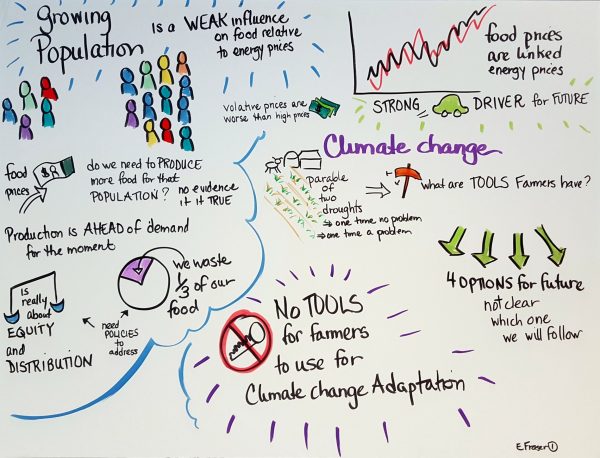
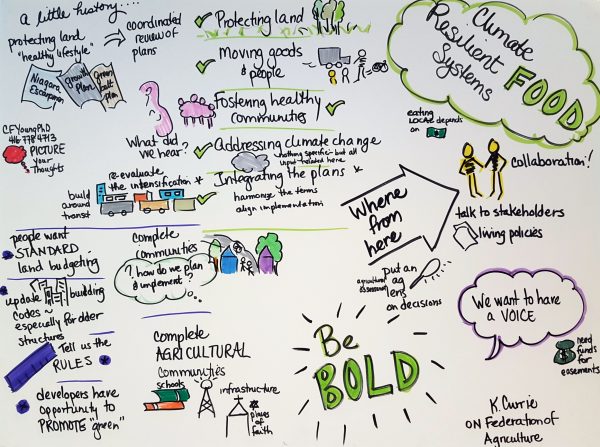
Research Priorities for Sustainable Bio-mass Harvesting
Harvesting biomass is receiving increased attention as a source of energy, yet many questions remain regarding its sustainability. The Canadian Forest Service convened a meeting of over 100 people to look at research priorities pertaining to harvesting biomass. The Service engaged envision to design and lead a first-of-its-kind, three-day, participatory meeting with researchers from around the world. In addition to presentations by leading authorities, the meeting included facilitated interaction through “round robin facilitation” and “conversation café.” The meeting was hailed as one of the most productive that the scientists had ever attended and resulted in the identification of Canada’s research priorities for the sustainable harvesting of forest biomass.
Doubling Toronto’s Tree Canopy
Trees have so many benefits – capturing carbon, improving our well being, increasing property values – to name a few. Yet, Toronto continues to loose trees faster than they are being planted. Working for the City of Toronto, envision designed and facilitated four workshops where participants identified land uses that were conducive to more trees. The results of the workshops fed into the City’s work to double the tree canopy.
Conflict Management, Team Building and Collaboration Training
Emerging resource managers require more skills than ever these days, including working well in groups and being able to constructively address conflict. envision worked for Faculty of Forestry, University of Toronto in designing and leading graduate modules in conflict management/team building and collaboration.
Reducing Tobacco Use in Pregnant Women
Reducing tobacco use could arguably be one of the most important ways to improve overall health – especially for pregnant women. Peterborough County-City Health (PCCH) hired envision to lead a session regarding future directions for its “Free to be smoke free” program. Using an “at the wall” graffiti board, envision helped participants easily map out related programs and who was working on “what” to enable the smoke-free program to expand its reach. In addition, envision facilitated and graphically recorded input for future directions into an easy-to-digest visual summary that the PCCH and program participants were able to refer to in future.
Improving Mental Health in Parkdale
Improving society’s mental health – particularly for those at-risk – is an enormous undertaking – many organizations and sectors have to be part of the solution. Through Innoweave and working with the Centre for Mindfulness Studies, envision coached the Parkdale Mental Health Collaborative to support them in defining what impact, specifically, they were looking to achieve (statement of impact) and how they would go about achieving such impact (theory of change).
Hearing All Voices Using Visual Communications
Helping meeting participants “see what they mean” contributes to improved communications all around and ultimately better achieving the objectives of any given meeting or event. envision created compelling murals that summarized key points on the way forward for. envision works with diverse organizations, taking large scale picture notes, to visually render their meetings, including:
- American Association of Retired Persons, Oregon Chapter
- Better Eugene Springfield Transportation
- Community forum for the York South Weston Strong Neighbourhood Strategy; City of Toronto
- Results and reactions from a survey on ways to end violence against women; White Ribbon Campaign Toronto
- “Be the One” event with Carlos Gomez; YWCA of Greater Hamilton
- Improving diversity at Hincks-Dellcrest; Hincks-Dellcrest/ DiversiPro
- Future of Black Scholarship; Office of Human Rights, Queens University
- Accessibility compliance and competence on campus; Office of Human Rights, Queens University
- Equity solutions for campus; Office of Human Rights, Queens University
- Effectiveness of global processes for civil society organizations; Ontario Council for International Cooperation
- Anti-racist Summit; Wilfrid Laurier University
For examples of this work, see the gallery at PICTURE your Thoughts.
Smart Commute Program Development
Efficiently moving people around large urban areas is an ongoing challenge. The City of Toronto’s Smart Commute Program (now with Metrolinx) helps commuters with ride matching and sharing choices so they can choose the best route(s) to save time and hassle. Smart Commute hired envision to work with community members and business owners in exploring ways to improve transportation options. envision designed and facilitated workshops where participants identified commuting challenges, brainstormed options for ride sharing, and itemized barriers for implementing such programs.
Strategic Planning for Active Transportation
Toronto Centre for Active Transportation (TCAT) hired envision to lead them through a participatory strategic planning process. In the assignment, participants refined their organization’s purpose, and clarified audiences that it serves. Using an “at the wall” technique, envision enabled participants to identify strategies that build on organizational and community strengths, and help overcome organizational and systemic barriers. In the final segment of the session, envision worked with participants to identify action steps and responsibilities so that TCAT makes progress on implementing its strategies.
Improving Water Quality in Lake Erie
Reducing phosphorous in Lake Erie is a big job – requiring many organizations and sectors to be part of the solution. Through Innoweave, envision coached the Lake Erie Alive collective to enable them to define what impact, specifically, they were looking to achieve (statement of impact) and how they would go about achieving such impact (theory of change).
Residential, Peer Learning Workshops on Organizational Effectiveness
Many environmental non-governmental organizations are smaller entities with big mandates. Learning from peers offers chances to address common challenges, hence increasing each organization’s effectiveness, both singly and collectively. Working with the Sustainability Network and the Walter and Duncan Gordon Foundation, envision designed and led multiple residential, peer-learning “Learning Network” workshop for non-governmental water leaders in Ontario and in Alberta.
Creating an Urban Water Centre at Ryerson University
As the world becomes increasingly urbanized, a healthy urban water cycle becomes more important. envision worked with four faculties at Ryerson University, who are not in regular contact, to build coherence across faculties and set a future collective direction to create an Urban Water Centre.
